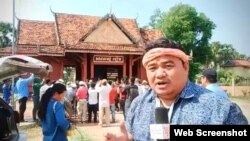On a sunny May morning in 2020, Sok Oudom joined fellow journalists to cover a protest over military plans to claim land in Cambodia's Kampong Chhnang province.
Armed with a microphone and a smartphone, and with a traditional red krama scarf wrapped around his head, Oudom started a livestream for his digital and radio media outlet, Rithysen News.
Several protesters were forthcoming with Oudom about their opposition to the plans. One took the mic and questioned whether the spike in land disputes could bring war back to Cambodia.
Oudom himself called on Prime Minister Hun Sen to intervene, then called out the governor at the time, Chhour Chandoeun.
The broadcast caught the attention of authorities.
The following day, police raided Oudom's home in the city of Kampong Chhnang and charged him with incitement.
The Information Ministry in Phnom Penh revoked the license for Rithysen News.
That December, a court sentenced Oudom to 20 months in prison.
The journalist's case was cited in a report by the American Bar Association Center for Human Rights, a U.S.-based organization that advocates for vulnerable communities and seeks to hold governments to account.
The association said Oudom's case is indicative of the challenges for journalists and activists accused of incitement.
Local and international rights organizations have previously cited Cambodia's use of the charge against critics.
The independent Cambodian Journalists Alliance, or CamboJA, has documented at least 168 cases of legal and physical harassment against journalists in the past two years, with nearly all those detained facing accusations of "incitement."
"The case of Mr. Sok Oudom is a personal tragedy, but it is also indicative of a wider issue of Cambodian authorities using draconian laws to target journalists and human rights defenders," Oliver Windridge, an international human rights lawyer who advised the ABA, told VOA Khmer.
"The right to freedom of expression protects not only the right to say things that are complementary or in favor of governments and authorities, but importantly, also the right to be critical and challenge governments and authorities."
Chin Malin, a spokesperson for Cambodia's Ministry of Justice, dismissed claims that authorities use incitement and other laws to target critics.
When asked about Oudom's case, he told VOA that journalists are not afforded "special privilege or parliamentary immunity to make them an exception from criminal responsibilities if they commit a criminal felony."
Media trial
In convicting Oudom, judges in Kampong Chhnang provincial court cited Article 495 of Cambodia's Criminal Code, which covers acts deemed to be "incitement to commit a felony or to disturb social security," through provisions laid out in Article 494 including speech, pictures or audio-visual communication.
At the final hearing, the provincial court judge told Oudom his words had "the potential to inspire the listener or citizens currently occupying the disputed land to commit acts which are crimes by going to occupy land."
The ABA report concluded the prosecution against Oudom ran contrary to both international and domestic legal and human rights practices.
Him Khortieth, the research and advocacy manager at CamboJA, followed Oudom's case closely, even attending hearings.
"Based on what I heard during directly being present in the trial, there seemed no serious and specific felony committed in their accusation against Mr. Sok Oudom," Khortieth told VOA Khmer.
He said many journalists are seeking clarification on where the line is between journalistic work and criminal activity; between protected expression and incitement.
Ministry spokesperson Malin said it is up to judges to decide what constitutes "incitement."
"Not the so-called Facebook judges, not the journalists, not the analysts, and not the civil society organizations – who are the outsiders – to consider these three aspects instead of a state judge," he said. "If anyone could do that, there would be no need to have a court system or judges in existence at all."
Back in Kampong Chhnang, issues of land grabbing, illegal fishing and deforestation are still present.
Prime Minister Hun Sen has made public remarks calling for action. In an audio address in November, he said officials involved in land grabs should be held accountable.
The following month, Kampong Chhnang's former governor Chandoeun was reported to be under investigation for his alleged involvement in taking 2,000 hectares of flooded forest area in the province.
The former governor has not spoken publicly about the investigation.
The forces stifling freedom of speech extend beyond the provincial level, the ABA said.
Its report found that the ruling party's "omnipresent influence over political and legal processes fosters an environment that punishes expression and gives little legal recourse to the accused."
"This is the environment surrounding Sok Oudom's criminal case," it added.
In September 2021, Oudom was released after an appellate court reduced his sentence.
VOA reached out to Oudom but the journalist declined the request for an interview.
He has returned to journalism, but he now maintains a lower profile while gradually restarting his news site and radio station.
This story originated in VOA's Khmer service.








